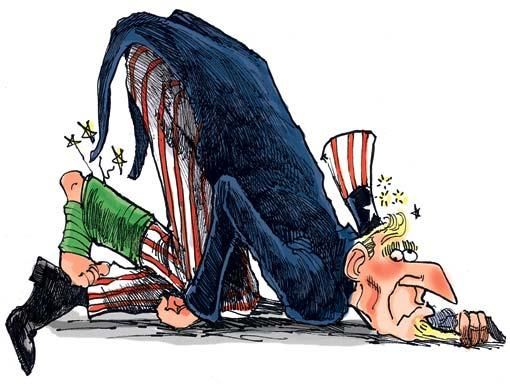Dump it or stay with it is a question being mulled over by private investors, financial institutions, major corporations and central banks around the world in relation to the weakened US greenback.
On Sunday it was the turn of the Organisation of Petroleum Exporting Countries (Opec).
Speaking at a press conference following the recent Opec meet in Riyadh, Iran's President Mahmoud Ahmadinejad said all member states are concerned about the falling US currency and have asked their finance ministers to study the feasibility of selling oil in another currency.
However, Opec's official communique omitted to mention any such intention probably due to Saudi Arabia's determination to not rock an already capsizing boat. It's interesting to note, though, that for the first time Saudi Arabia declined to cut interest rates in concert with the last Federal Reserve decision.
It is certainly a dilemma for oil-producing nations. Sticking to a currency in decline doesn't appear to make financial sense on the surface, but were they to change, say, to euros there is a good chance the dollar would collapse causing chaos in world markets and a possible global recession.
The GCC must make similar decisions over the dollar peg with the exception of Kuwait which unilaterally made the switch earlier this year and has since seen its currency revalued upwards by 4.5 per cent.
The peg has served GCC nations well for decades but is now triggering inflation due to the high cost of imports. It is also distressing the workforce, whose income in real terms is diminished. This is especially worrying for expatriates with financial commitments in their home countries, such as mortgages or a need to support dependants.
Last week, the Governor of the UAE Central Bank Sultan Bin Nasser Al Suwaidi hinted that the Emirates may instead link the dirham to a basket of currencies that would also include the dollar. "It's not my prediction but everybody is expecting that the US dollar will go down further. It will trigger a review," he said during a visit to South Korea.
Previously, Al Suwaidi has indicated the UAE would not move without a consensus from its fellow GCC partners but there is a general impression that Saudi Arabia, Bahrain, Qatar and Oman are reluctant to alter the status quo. Eventually the UAE will have to decide whether to bite the bullet or go it alone.
Although the discussions conducted by Gulf countries over whether to discard the petrodollar and de-link GCC currencies from the greenback are pragmatically focused on economics, this isn't the case for all Opec members.
Iran and Venezuela, for instance, view the dollar as a symbol of American hegemony and are keen to do away with it for primarily political reasons.
Vulnerability
The fact that such a debate is underway illustrates America's vulnerability and at the same time the clout wielded by oil producers should they choose to use it to influence US foreign policy.
For instance, the Arab world may not have a nuclear bomb but it does have the wherewithal to bomb the American economy. In this case, staying with the dollar ensures they always have a bargaining chip when push comes to shove.
China is similarly placed due to its massive holdings of US Treasury Bonds, estimated at $800 billion. Irritated by US pressure to revalue the Chinese Yuan, earlier this month two Chinese officials warned the US State Department that China possessed the "nuclear option" to off load its US dollar denomination assets.
And even though most Western economics believe such a step would similarly hurt China even its mention set-off a dollar slump.
Other countries planning to diversify their dollar holdings include South Korea, Sudan, Venezuela, Japan and Russia, which has ambitions to open an oil bourse trading in roubles. Italy, Switzerland and Sweden have already made adjustments to their foreign exchange reserves.
US influence is further being eroded in South America by Venezuelan-led plans for a new bank - Banco del Sur - that would eliminate the region's dependency on the World Bank and the International Monetary Fund; institutions that the Venezuelan President Hugo Chavez refers to as "tools of Washington".
The six other founder nations are Argentina, Bolivia, Brazil Ecuador, Paraguay and Uruguay, which may soon be joined by Chile, Colombia, Peru Guyana and Surinam.
If Latin American countries move out of their current holdings of US Treasury Bonds - estimated at around $500 billion - the impact on the dollar could be enormous.
Billionaire investor Jim Rogers, Chairman of Rogers Holdings and a former partner of the man with the Midas touch George Soros, recently warned, "If you have dollars, I urge you to get out. That's not a currency to own". He may be right.
There's a message here. The US may be the most militarily powerful and technologically advanced country in the world but even a roaring giant can be stopped in its tracks when he's hit where it hurts the most in his pocket and especially when that pocket is also his Achilles heel.
Linda S. Heard is a specialist writer on Middle East affairs. She can be contacted at lheard@gulfnews.com.










